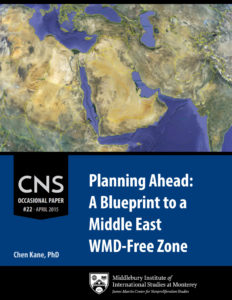Chen Kane
April 22, 2015
Occasional Paper #22
Read the full Occasional Paper No. 22:
Planning Ahead: A Blueprint to Negotiate and Implement a Weapon-of-Mass-Destruction-Free Zone in the Middle East
About the “Zone”
Freeing the Middle East from all weapons of mass destruction (WMD) and establishing a weapon-of-mass-destruction-free zone (WMDFZ) is a concept that originated many decades ago. Although this idea has existed for more than forty years, surprisingly little thought has been given to how it can be realistically implemented. Currently, there remain significant gaps regarding core concepts of the WMDFZ (the “Zone”) negotiations and implementation within the Middle East and internationally.
The James Martin Center for Nonproliferation Studies offers a new report in an effort to address these gaps with regard to the planned WMDFZ Middle East Conference, negotiation process, and the subsequent establishment of such a Zone by identifying the legal, technical, and organizational elements required to support the Zone negotiations and implementation.
Creating a WMDFZ is a very tall order; not only has one never been created before, but also all existing nuclear-weapon-free zones (NWFZs) formalized an already existing situation—the absence of nuclear weapons in their region. The WMDFZ, by contrast, is aimed at reversing the status quo by dismantling existing WMD capabilities and programs in a region that is suspected of hosting all three categories of WMD. Moreover, the region suffers from deep-rooted conflicts and mistrust, and many areas are undergoing considerable social and political change. The increasing influence of non-state actors on states’ affairs in the region is another complicating factor. Additionally, while there are regional and international regimes and organizations charged with verifying the peaceful nature of nuclear energy programs and chemical industries (all of which could inform the WMDFZ negotiators), there are no comparable mechanisms to cover nuclear and biological weapons dismantlement, verify sensitive activities for biological programs, nor sufficiently regulate WMD delivery systems—all of which are mandated under the Middle East WMDFZ.
Proposals
The report offers a number of constructive suggestions that could engender significant progress on the issue, even while the current political impasse precludes states’ ability to make political commitments or convene the WMDFZ Conference prior to the 2015 NPT Review Conference. For instance, states can create a Group of Experts to discuss legal, technical, and organizational issues essential to negotiating and implementing the Zone. Many of the issues identified in this report should be discussed first within regional states in a comprehensive interagency process, not just to formulate national positions on the issues, but also to clarify their declared, undeclared, known, or unknown WMD capabilities.
The regional experts group could also consider key legal aspects such as the negotiation mandate, scope, rules of procedures, and delineation of the Zone. This would include identifying options for issues such as: what weapon systems would be prohibited under the Zone (i.e., only nuclear, biological and chemical weapons and their delivery systems, or also radiological); what should be states obligations under the Zone; are there areas where agreement already exists; and in what ways existing NWFZs and no-first-use agreements could apply to the Middle East.
On the technical aspects, the report offers ideas and highlights issues on how to implement WMD weapons and programs disarmament and create an “effectively verifiable” verification mechanism. The report identifies sets of lessons learned from the five NWFZs, previous WMD dismantlement experiences such as South Africa, Libya, and Syria, and existing regional verification organizations such as ABACC and Euratom. Importantly, it is essential for the political and technical experts to work hand-in-hand to ensure that the politically desirable falls within the realm of the technically feasible. This includes examining what are the verification lessons from past cases of WMD disarmament and dismantlement, to what extent will states be required to declare past or existing WMD programs, how can negotiators address the strategic linkages in the region between acquisition and dismantlement of chemical and nuclear weapons; and how and by whom will verification of dismantlement and compliance be conducted.
On the organizational level, the experts’ group could define how broadly or narrowly issues concerning the Zone will be defined. While the Zone may be defined narrowly to address the proliferation of WMD in the region, it is important to note that not one of the existing NWFZs exists in the absence of a regional architecture and agreed upon principles for cooperation and security. The experts’ group may want to address the underlying causes for regional WMD acquisition, as well as to adopt a set of principles regarding arms control and regional security that would govern relations among states in the region. To assist overcoming the prevailing mistrust, the group should also discuss the role of confidence-building measures (CBMs) as part of the Zone negotiation and implementation, and identify relevant unconventional and conventional CBMs to be implemented as part of the Zone.
The group could also recommend whether there is a need to establish a regional organization to ensure implementation of the treaty, address compliance and enforcement issues, and promote the peaceful applications of nuclear, biological, and chemical technologies. Given the prevailing reality of the region where non-state actors have tried to acquire WMD capabilities, targeted strategic infrastructure, and have gained control over significant territories (including where WMDs are located), the group could address how the Zone provisions would tackle this emerging threat.
If regional states are unwilling to commit experts to the process, an alternative route is to establish the dialogue as a track-two or track-one-and-a-half process. Because of the unique political and geo-strategic circumstances of the region, nongovernmental experts have played a critical role by providing the only forum for regional dialogue on arms control and nonproliferation in the Middle East since 1995, thus having much to offer in laying the foundations for an eventual WMDFZ.

